Don't throw away watermelon rinds: beneficial properties for the human body
Adults and children love the sweet pulp of watermelon. But we throw away the crusts without hesitation. But they have useful properties, the existence of which not everyone knows. Their use in raw, dried or infused form will help in the treatment of a number of common diseases - for example, high blood pressure, constipation and others.
In this article we will talk about the benefits, harms and uses of watermelon rinds.
Chemical composition, trace elements and vitamins of watermelon rinds
Watermelon rinds have a rich chemical composition:
- water - 90%;
- fructose - 5%;
- sucrose - 5%;
- glucose - 10%;
- pectin - 1%;
- fiber - 0.5%;
- omega-3 and omega-6;
- elements: potassium, calcium, magnesium, fluorine, sulfur, sodium, phosphorus, fluorine, aluminum, copper, zinc, manganese, iron;
- plant polyphenols and flavonoids.
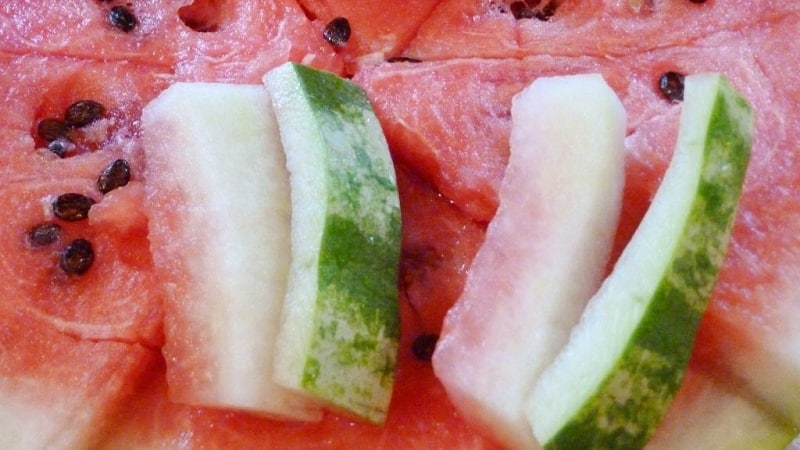
Besides, they contain important amino acids:
- valine;
- citrulline;
- isoleucine;
- threonine;
- phenylalanine.
Rich peels and vitamins: C, B1, B2, B6, B9, A, E.
Calorie content is 18 kcal - 1.15% of the daily value.
Beneficial properties of watermelon rinds and their uses
Not everyone knows about the beneficial properties of watermelon rinds., so they throw them away, but in vain. The peels contain less moisture and sugar than the pulp, but there is much more fiber and chlorophyll, amino acids and some other active components.
Attention! Watermelon peels can be used as a diuretic, analgesic, cleansing, choleretic and expectorant.
In folk medicine, people use watermelon rinds to prepare infusions, decoctions, etc.. At the same time, raw and dried peels also have healing properties, and they can be used all year round if you follow the harvesting technology. So, let's take a closer look at the benefits of watermelon rinds for the human body.
For the human body
Due to its composition, watermelon rinds have the following effect on the human body:
- In case of heart and kidney diseases, swelling is relieved.
- Normalize metabolic processes.
- Reduces high blood pressure.
- Reduce the severity of cellulite and help reduce excess weight.
- Improves well-being in case of gout.
- Helps restore the body after a serious illness or long-term treatment with medications.
- Remove excess salts, toxins and waste.
- Inhibits inflammatory processes in the digestive system.
- They normalize the frequency and quality of stool, having a positive effect on intestinal function.
- Promotes easier passage of kidney stones, while reducing the likelihood of new ones appearing.
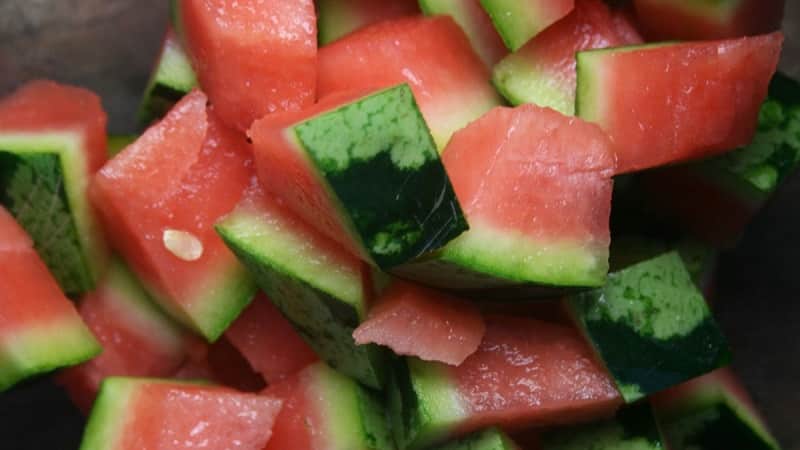
Watermelon rinds do not need to be boiled, they are used in the form of candied fruits or in powder form.
Interesting things on the site:
Watermelon guards male power: how is it useful?
A woman’s faithful friend is a watermelon: how is it useful?
Use in folk medicine
Watermelon rinds have a wide range of uses in folk medicine:
- The decoction has a diuretic effect and is used by people with problems of the genitourinary system.
- Drink the solution for various edema caused by diseases of the heart, kidneys, liver and blood vessels.
- Drinking the decoction daily helps prevent the progression of urolithiasis.
A decoction of watermelon rinds is also drunk for such diseases.:
- colitis;
- pyelonephritis;
- angina;
- tuberculosis;
- bronchitis;
- hepatitis;
- diabetes;
- migraine;
- constipation;
- hypertension;
- diarrhea, etc.
In cosmetology
Watermelon rinds have also found their place in cosmetology. Most often, they are used to make face masks. - this allows you to refresh, rejuvenate, and saturate it with useful substances.
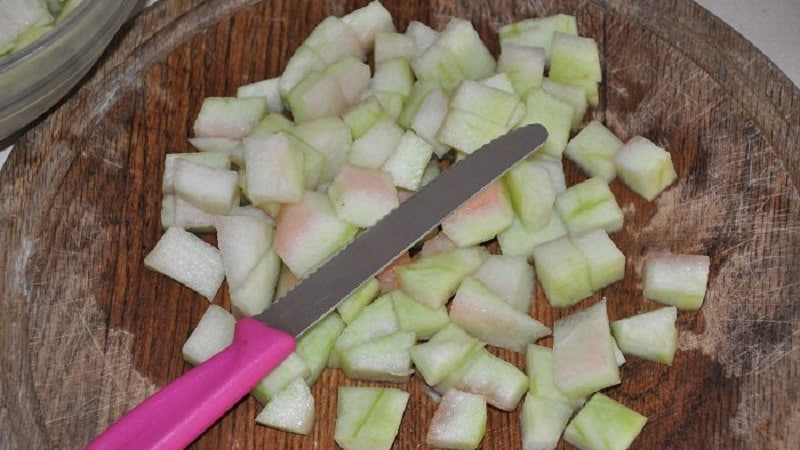
How to prepare it correctly
There are different ways to prepare watermelon rind.. The main thing is to strictly follow the instructions. The most popular harvesting technology is drying. In order for the final product to be of high quality, the raw materials must be properly prepared. To do this, separate the peel from the pulp and carefully cut off the toughest layer.
Next, cut the remaining crust into small and thin strips, lay out in one layer on a baking sheet and place in the oven, drying at a temperature not exceeding +50°C. You can dry the peels in an electric dryer or in the sun; this will not destroy their beneficial properties. Store dried watermelon rinds in paper or linen bags.
Attention! If you are not completely sure of the quality of the watermelon, then before harvesting the rinds it is recommended to soak them in water for 1.5-2 hours, and then rinse them thoroughly.
Features of application
Despite the benefits, uncontrolled use of large quantities of infusions, decoctions and other products based on berry crusts is prohibited. Before use, you should consult a specialist and only then begin treatment. Application according to the scheme and within the norm will help get rid of diseases and will not harm your health.
In folk medicine
In folk medicine, decoctions, infusions and dried watermelon rinds are used.. They are mainly used to treat the presence of stones in the gall bladder and kidneys, for various stomach problems and to combat excess weight. Let us consider in more detail the recipes for preparing decoctions and infusions for a specific disease.
For kidney stones:
- Powder: watermelon skins are dried and ground into powder. Take it 2 tsp. per day, washed down with tea or freshly squeezed juice.
- Infusion. To prepare the infusion, take 2 tbsp. l. watermelon rind powder, pour 2 tbsp. boiling water, leave for 40-60 minutes, then divide the infusion into 3-4 parts and drink during the day, after meals.
- Decoction: 1 tbsp. l. watermelon powder pour 1-1.5 tbsp. boiling water, put on fire and cook for 5-7 minutes over low heat. The resulting broth is infused for 30-60 minutes, divided into three parts. Drink the resulting decoction half an hour before meals, adding a little honey.
- Dry crusts are used in the treatment of gallstones. About 150 g of dry crusts are poured into 1 tbsp. boiling water, leave for 1 hour. The resulting solution is divided into two parts, drinking no more than a glass at a time.
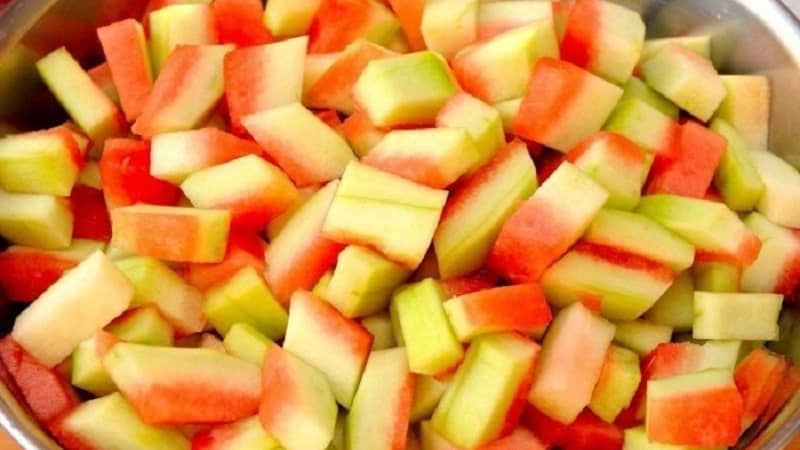
For dysbacteriosis and colitis:
- 100 g of raw or 80 g of dried watermelon peel pour 1 tbsp. boiling water Leave for an hour, filter thoroughly, divide into 3-4 equal portions and consume a day, preferably before meals.
- 1 tbsp. l. watermelon powder pour 1 tbsp. boiling water and cook for 10 minutes over low heat. Remove from heat, leave for 30-40 minutes, divide into three parts and drink per day.
- Add 500 g of watermelon skins to 0.5 liters of boiling water, place on low heat and boil for half an hour. It is recommended to take the resulting decoction warm in 2-3 doses per day.
For obesity:
- 2 tbsp. l. The dried peel is steamed with 0.5 liters of boiling water, left for an hour and consumed the decoction a day.
- Fresh peels are grated on a medium grater, pour 250 ml of hot water, leave for 15-20 minutes, use 1 tbsp. l. three times a day.
To cosmetologists
Let's consider several recipes for using watermelon in cosmetology:
- Fresh watermelon rinds are grated, a little olive oil is added, and thoroughly mixed until smooth. Apply the resulting mask to the face, leave for half an hour and rinse with warm water. The product is great for women with oily skin.
- The watermelon rinds are grated, sour cream and a little honey are added, and mixed to a porridge-like consistency. Apply the resulting mixture to the face for 20-30 minutes, then rinse thoroughly with water. The product moisturizes and refreshes the skin.
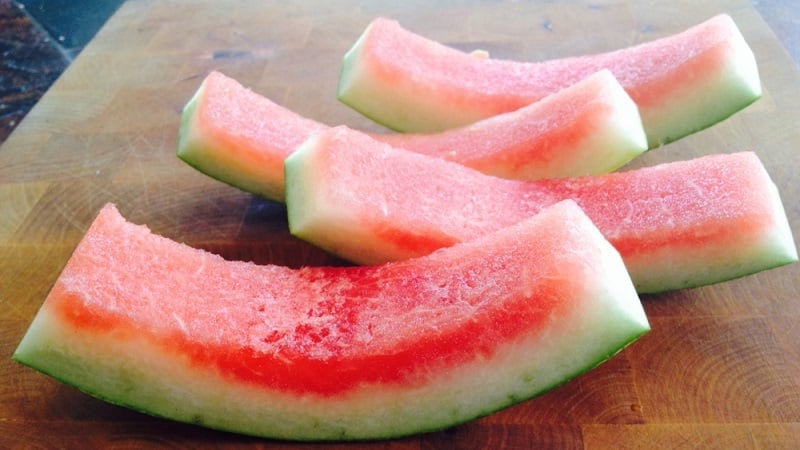
Harm and contraindications
Watermelon and its rind have no serious contraindications. Ingestion of watermelon peels is not recommended in the following cases:
- with frequent or chronic loose stools;
- with urolithiasis;
- with exacerbation of diseases of the gastrointestinal tract;
- for diabetes mellitus;
- in advanced forms of obesity.
Keep in mind that frequent use of decoctions and tinctures of watermelon rinds leads to leaching of potassium from the body.
Conclusion
Watermelon is not only a tasty berry, but also a source of useful microelements and vitamins. Even watermelon rinds can improve your health. Take infusion, decoction and other healing solutions from the crusts strictly according to prescriptions and in a certain quantity - then a positive result will not be long in coming.